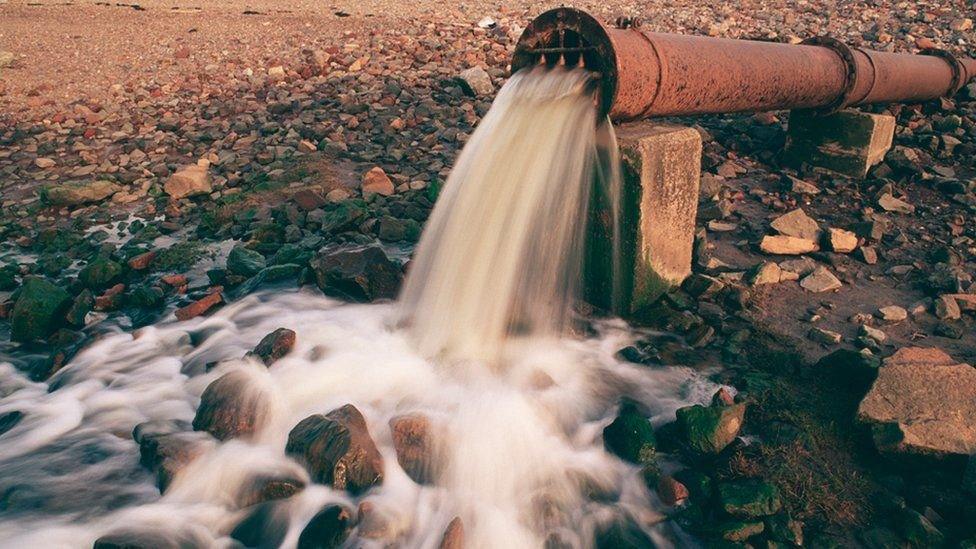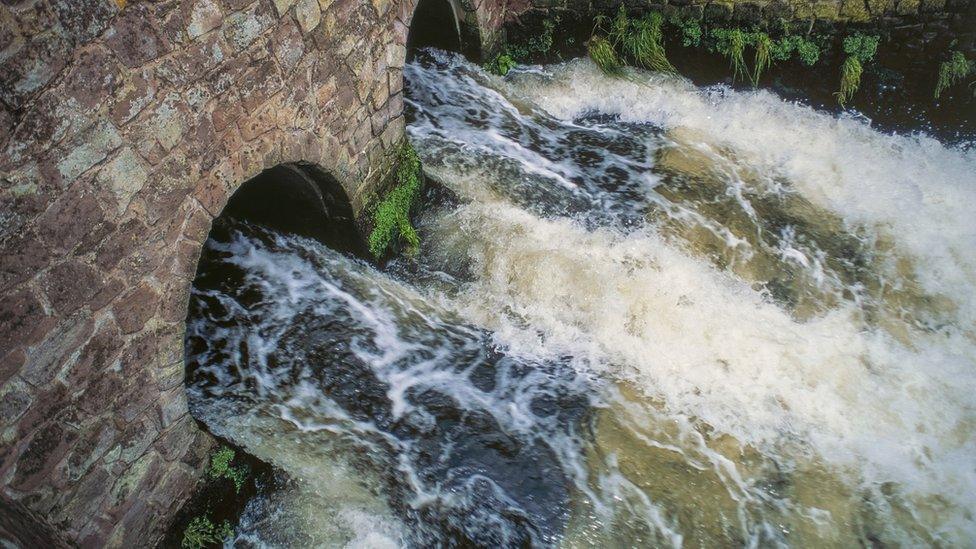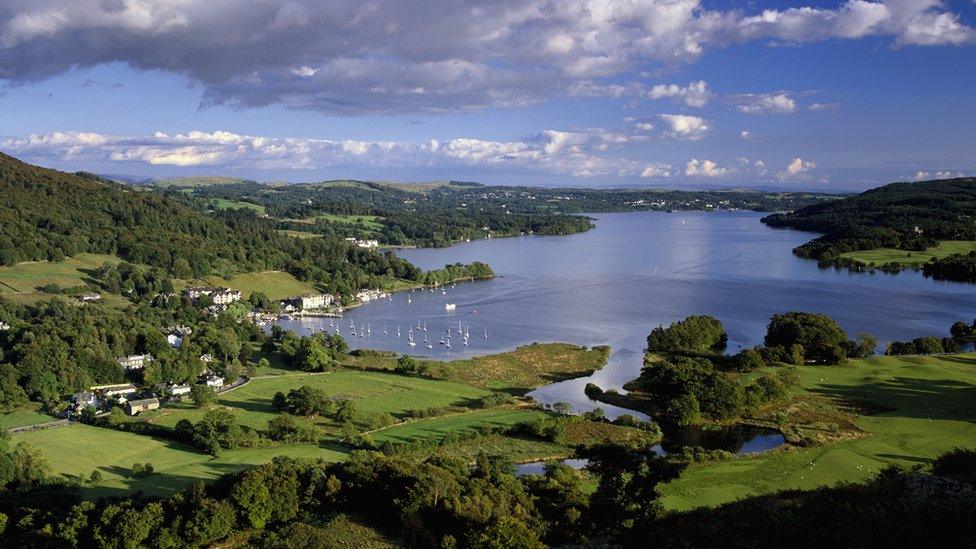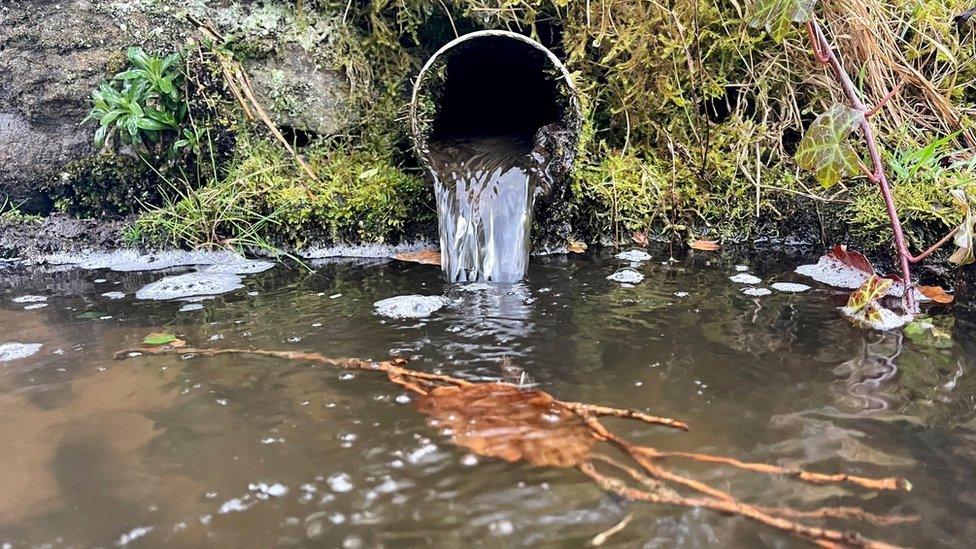Sewage: Water companies apologise for number of spills in 2022
- Published
- comments

England's water and sewage companies have said they are sorry for not "acting quickly enough" to deal with sewage spills over the last year.
During 2022 raw sewage was dumped into rivers and seas for 1.75 million hours - or 825 times a day on average.
The government, campaign groups, and the public had been upset about this due to the risks it posed to people or wildlife, and that it had happened so many times.
Campaigners have said while they welcome the apology wan, they want to see if the water companies will handle things differently in the future.
Why was sewage released in rivers and seas?
Companies are sometimes allowed to spill sewage following heavy rainfall to prevent the system becoming overloaded, which could lead sewage to overflow and even pour our in people's homes.
But the criticism has been that these spills are happening too often.
Why is sewage closing beaches?
Swimming in water where untreated sewage is discharged can lead to serious illnesses such as stomach bugs, which may cause diarrhoea and/or vomiting, as well as breathing, skin, ear and eye infections.
Wildlife including fish and insects can also be harmed or even killed from sewage pollution, and it can cause algae blooms which starve fish and other organisms of oxygen.
What have the water and sewage companies said?
The apology was made by Water UK, the industry body which represents nine water and sewage companies in England.
This includes Anglian Water, Northumbrian Water, Severn Trent Water, South West Water, Southern Water, Thames Water, United Utilities Water, Wessex Water and Yorkshire Water England.
We're sorry about the upset and the anger from the fact that there have been overspills of untreated sewage onto beaches and into rivers over the past few years. We're sorry that we didn't act sooner, and but we get it.
The companies have promised to give three times more funding to upgrade sewer systems, and to let public know when there have been sewer spills with "near real-time" data.
But the government had already announced last month that by 2025 companies would need to do this by law.
They are also already required to cut sewage spills by 25%, or just over 100,000 event by 2025.
This is something they achieved last year, despite the many spills that took place - but the companies have promised to go further, and cut spills by up to 35% by 2030.
This would mean the public could expect to see around140,000 spills, compared with more 400,000 in 2020.
This announcement doesn't affect Scotland, Wales or Northern Ireland who have their own water companies and ways of dealing with sewage.
In Scotland and Northern Ireland it is run by government-owned companies, while in Wales the water company does not aim to make a profit.
They also have their own action plans to tackle sewage spills which are not included in Water UK's announcement.
The water companies have also said they were ready to invest £10bn to upgrade their sewage infrastructure and establish 100 new swimming areas.
But to pay for this household could face higher bills, so this will first have to be reviewed by the water regulator Ofwat, to decide if this extra investment is the right step for the companies to take.
Water UK said the initial funding would be raised from investors, and would only be paid back by customers by small increases to their bills each year.
What has the response been to the apology?
Algae caused by sewage ruining Windermere
Alan Lovell, chair of the government body the Environment Agency, welcomed the apology and efforts by the companies to rebuild public trust, adding "Now we want to see action and a clear plan for delivery".
Marine conservation charity Surfers Against Sewage (SAS) has also welcomed "the long overdue apology" - but said the investment should not be paid for through higher bills, but rather by the money the companies take away themselves.
The UK public has already paid for environmental protection from sewage - but we're yet to see it. And whilst the water industry rakes it in, this investment pledged by Water UK must come out of water company profits, not from the bill payer
Last year the Commons Environmental Audit Committee chair, Conservative MP Philip Dunne warned the UK's rivers were a "chemical cocktail" of raw sewage, microplastics and slurry.
He told the BBC that he hopes this £10bn increase in investment would be allowed by the regulator, as he thinks the companies have "provided a promising plan to tackle poor water quality and take vital steps to improve the country's ageing sewerage infrastructure".
Water Minister Rebecca Pow said: "The government has put the strictest targets ever on water companies to reduce sewage pollution. I am pleased that they are now taking action to deliver on this - but there is still a great deal more to do."
- Published27 August 2022

- Published2 December 2021

- Published27 October 2021

